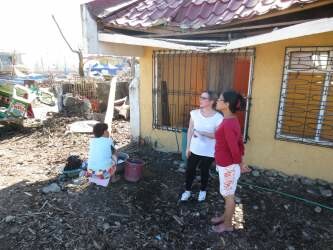
This meant that it was imperative for all forms of foreign aid to be cleared and distributed in the most efficient manner possible in order to meet the urgent needs of affected communities. Ensuring adequate emergency and temporary shelter for those people whose homes had been damaged or destroyed was also a key priority. In November and December 2013, two members of the Disaster Law Programme team were deployed to the Philippines to provide support on International Disaster Response Law (IDRL) and Housing, Land and Property (HLP) issues.
In the days following the disaster, the DLP Coordinator for Asia Pacific, Tessa Kelly, was deployed to Manila to assist the IFRC Delegation and Philippine Red Cross on IDRL and related legal risk management issues. A few weeks later, Disaster Law Delegate Lucia Cipullo was also deployed in response to a request from the Shelter Cluster for urgent support on HLP and shelter issues.
While on mission, Tessa met with emergency response teams, UN agencies, and key government departments to collect and validate information on issues that had arisen with regard to immigration and customs procedures, and the provision of visas for relief personnel. Upon a request from the Department of Foreign Affairs, Tessa also compiled existing national legal documents and assisted in drafting a new set of guidelines for international assistance based on draft Model Emergency Decree currently under development by the IFRC and OCHA. The Philippine government promptly set up ‘One Stop Shops’ situated at international airports, bringing several government agencies together in one location to expedite customs clearances for humanitarian shipments. This innovation drew on similar approaches by Indonesia and Guatemala, and on the model set out in the Model Act on IDRL co-developed by the IFRC, OHCA and the Inter-Parliamentary Union.
With over one million homes damaged or destroyed, ensuring adequate emergency and temporary shelter for almost four million displaced people was also high on the agenda of national and local government in the Philippines, as well as the assisting humanitarian actors. Major HLP issues that needed to be addressed included the declaration of ‘no build zones’ and their impact on relocation and resettlement, informal settlements, and the use of ‘bunkhouses’ as temporary shelter and the standards to which they are being built
During her deployment, Lucia was based with the Shelter Cluster at the UN office in Manila, where she was responsible for convening an inter-cluster HLP technical working group and developing a common humanitarian position on HLP concerns. Lucia also undertook HLP advocacy efforts and provided support and advice to the shelter coordination team and its partners. Lucia travelled to Cebu for a shelter coordination team retreat and also to Tacloban where she convened an inter-cluster meeting on HLP issues, undertook community consultations and visited several bunkhouse sites together with other technical advisors from the shelter coordination team.
These deployments represent a new precedent for the Disaster Law Programme and its involvement in emergency operations. “The scale of the response required after Typhoon Haiyan clearly highlighted the need for legal support in a number of areas, including IDRL, legal risk management, and shelter”, says Lucia. “Our deployments demonstrated not only the capacity within the DLP to support the Red Cross and important partners like the Shelter Cluster, but also the increasing operational relevance of our work and the contributions we can make”.